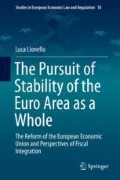Abstract
This chapter provides a general introduction to the work; the research aims to investigate the pursuit of the stability of the euro area as a whole in the light of the reforms adopted over the last few years and the ongoing debate on the completion of the Economic and Monetary Union (EMU). The methodology adopted takes into consideration the singularity of the economic governance, which is based on different legal sources, and evaluates the analysis developed in the case law of both European and national courts, as well as the contribution of the other social sciences on the matter.
Access this chapter
Tax calculation will be finalised at checkout
Purchases are for personal use only
Notes
- 1.
‘All euro area members must conduct sound national policies in line with the agreed rules. They have a shared responsibility for the economic and financial stability in the area.’ Statement by the Heads of State or Government of the European Union, Brussels, 11 February 2010. Cf. also Statement by the Heads of State and Government of the Euro Area Brussels, 25 March 2010; Statement on the support to Greece by Euro area Members States, Brussels, 11 April 2010; Statement of the Heads of State or Government of the Euro Area, Brussels, 7 May 2010.
- 2.
‘On the definition of monetary sovereignty see Lastra (2006), p. 16.
- 3.
As the German Constitutional Court has specified in the Judgment on the Maastricht Treaty , the introduction of the single currency did not transform the European Union into a federation, because Member States remained ‘the masters of Treaties’. See German Constitutional Court, Judgment of 12 October 1993, BVerfGE 89/155, paras. 112, 135.
- 4.
Fiscal policy consists of the power to decide the revenues and expenditures of a state. This competence is exercised through a budgetary law, which is normally adopted every year by the parliament on proposal from the government. Economic policy is a wider concept, which in addition to fiscal policy covers also other structural policies such as industrial, regional and social policies. Tuori and Tuori (2014), p. 31.
- 5.
There is a close link between economic policy, tax collection, social welfare systems, employment policy, expenditures for national defense and infrastructure. For this reason, Member States do not want to make any transfer of their ultimate sovereign control over their economic policies as such, but only accept obligations outlined in the Treaties. Goebel (2007), p. 1273.
- 6.
See Delors Report on Economic and Monetary Union in the European Community, 17 April 1989¸ pp. 16–17.
- 7.
On the connection between monetary and fiscal policy see Munari (2015), pp. 739–340.
- 8.
Since 2010, the ECB has adopted some non-conventional monetary policy, including the Securities Market Programme (2010), the Outright Monetary Transaction (2012) and the Quantitative Easing (2015).
- 9.
- 10.
Tuori and Tuori speak in this regard of a process of ‘constitutionalisation’, which has been developing through a number of foundational events and thanks to the contribution of several actors. Tuori and Tuori (2014), pp. 3–4.
References
De Grauwe P (2013) The European Central Bank as lender of last resort in the government bond markets. CESifo Econ Stud 59:520–535
Goebel RJ (2007) Economic governance in the European Union: should fiscal stability outweigh economic growth in the stability and growth pact? Fordham Int Law J 31:1266–1359
Lastra RM (2006) Legal foundations of international monetary stability. Oxford University Press, Oxford
Munari F (2015) Da Pringle a Gauweiler: i tormentati anni dell’Unione monetaria e i loro effetti sull’ordinamento giuridico europeo. Il Diritto dell’Unione Europea, 723–755
Steinbach A (2016) The lender of last resort in the Eurozone. Common Mark Law Rev 53:361–384
Tuori K, Tuori K (2014) The Eurozone crisis. A constitutional analysis. Cambridge University Press, Cambridge
Author information
Authors and Affiliations
Rights and permissions
Copyright information
© 2020 Springer Nature Switzerland AG
About this chapter
Cite this chapter
Lionello, L. (2020). General Introduction. In: The Pursuit of Stability of the Euro Area as a Whole. Studies in European Economic Law and Regulation, vol 18. Springer, Cham. https://doi.org/10.1007/978-3-030-28045-1_1
Download citation
DOI: https://doi.org/10.1007/978-3-030-28045-1_1
Published:
Publisher Name: Springer, Cham
Print ISBN: 978-3-030-28044-4
Online ISBN: 978-3-030-28045-1
eBook Packages: Law and CriminologyLaw and Criminology (R0)

